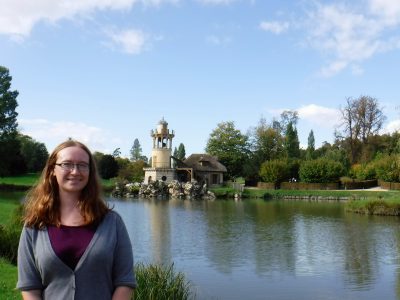 In this post, undergraduate student Jeanette Schramm writes from Lyon, France to make her pitch about the value of studying history abroad.
In this post, undergraduate student Jeanette Schramm writes from Lyon, France to make her pitch about the value of studying history abroad.
It’s difficult to deny the benefits of trying new experiences and challenging yourself. As I wandered about on my first day in Lyon, however, disoriented and dragging heavy suitcases under the hot sun, I could’ve offered a few counterarguments! Exactly one year earlier, I had been simply exploring possibilities for further developing my History and French combined degree. Little did I know that one year later I would be pinning a Canadian flag to my backpack and boarding a plane for France to begin a year-long academic exchange at Université Jean Moulin. It has been the greatest of learning experiences and the best lessons were gained that first day. When I wasn’t stumbling through appeals for directions in my amateur French, I was taking in the hidden historical gems of my new home. That first day I learned that this exchange offers not only the daily opportunity to live the history, language and culture of France, but the chance to challenge myself and, sometimes, get a little lost.
Though the language barrier was difficult the first day, the real challenges were yet to come. I’m in the DEUF (Diplôme d’études universitaires françaises) program which is designed to allow exchange students to take courses with regular French students. In addition to the language factor, it took time to get accustomed to the structure of French courses. There are two types of courses, cours magistraux (lectures) and travaux dirigés (tutorials) and most consist of only two hours of class per week. The format is usually just a professor speaking off their notes at the front of a lecture hall, with no slideshow presentation or mandatory readings and sometimes not even a syllabus provided. And in the end, the DEUF student’s entire mark is based on a single final paper or oral exam (in French). Though daunting, these courses provide an incredible opportunity to explore French and European perspectives on global history and events.
Of course, most of the exchange experience happens outside of the classroom. While lost that first day in Lyon, I discovered that my residence sits in the shadow of the Villa Lumière where, as any Lyonnais will tell you, cinema was born. In fact, Lyon is a historical treasure trove with museums and ancient sites dating back to the Roman Empire. The city also holds the title of Gastronomic Capital of France and gathering with friends at a bouchon (traditional Lyonnais restaurant) guarantees some of the best food in the country. Beyond Lyon, all of Europe lies at your fingertips thanks to proximity and affordability, especially for students. It’s amazing to discuss Louis XIV in class one day and visit the Palace of Versailles the next, or to accidentally stumble across small surprises like a WW2 memorial to a Canadian soldier in a small Scottish town. It’s worth getting a little lost to explore it all.
In many ways, that first day in Lyon set the scene for my exchange. Going to France has given me the opportunity to enhance my French language skills and discover history both inside the classroom and out. I would encourage any student considering an exchange to similarly tailor it to their goals, whether that’s learning a language or exploring a different culture. But whatever experience you choose, make sure to challenge yourself and get just a little lost.